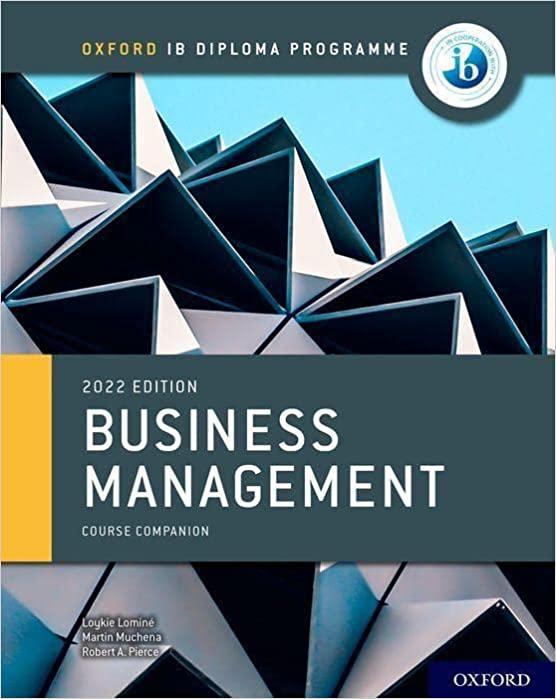Question
ASIAN INTERNATIONAL GROUP MINIMIZING RISKS Companies that extend credit want to assess the risk of not being paid by their clients, with many of whom
ASIAN INTERNATIONAL GROUP MINIMIZING RISKS
Companies that extend credit want to assess the risk of not being paid by their clients, with many of whom they have had no previous experience. While large companies often have their risk assessment experts or use the expensive services of consultants, medium-size companies with annual revenues of $50-200 million have traditionally found it difficult to assess the risk involved in doing business globally. One Asian company saw this as a business opportunity and decided to offer these firms the tools to reduce their exposure to credit risks, network security threats, ID theft, and other risks. The Web allowed it to offer expertise online.
Asian International Group, Inc. (AIG) is one of the world's largest insurance and financial services companies, with operations in 95 countries. The company offers its Web site, which provides up-to-the-minute credit information about businesses that intend to buy goods and services from AIG's clients. Clients log on and can assess and monitor the buying power and repayment capabilities of a customer. AIG's system tracks, in real-time, the financial standing of companies around the globe. This helps the sellerAIG's clientto set down payments and payment timetables that consider the risk of not being paid on time or at all.
In addition, the system tracks and assesses country-specific risk variables, such as political instabilities and changes in trade laws. It also updates risks related to specific industries rather than the country in which a buyer operates. The risks are determined by experts who update the systems frequently. AIG developed the original system in-house and implemented it in 2011. However, every time risk algorithms changed, programmers had to modify the code. The programming was time-consuming and costly. The IT department had to modify the original system to contain a structured credit algorithm that could be adapted to individual countries based on parameters that characterized business conditions and credit practices in each country. The idea was to separate the algorithms from tables that contain changing parameters. This way, managers can change parameters in the country and industry tables, and the changes take effect in the algorithms automatically. This keeps the need to reprogram to a minimum.
The manager of AIG's eBusiness Risk Solution Division, said that the major challenge was to transform the business rules into software code and design the software for fine-tuning those rules without too much hassle. The system contains risk models shared by all countries and special rules for each country and even regions within countries.
For the original DSS, experts developed complex risk models in Microsoft Excel. The models were eventually converted into Java for installation at AIG's Web site. The system became increasingly complex. After several years of operations, the IT professionals realized that developing rules for additional countries took too long, about two months for each country. AIG purchased a financial risk DSS called Blaze Advisor from Fair Isaac, a credit assessment firm.
With the integration of Blaze Advisor, managers can change decision rules without involving programmers. Within the first three months of using the integrated system, AIG added 17 countries to the mere two covered before. The rules for a country already in the system can be updated with new regulations within eight hours. Risk models, rating criteria, and decision algorithms for new countries can be added in 5-14 days.
A subscriber to AIG TradeCredit.com logs on and enters the details identifying a company with which the subscriber wishes to do business. The subscriber receives a real-time assessment of the potential buyer's ability to pay for goods and services. The subscriber can also receive the payment history of the company and make his or her own decisions. The system works so well that it is endorsed by the U.S. Chamber of Commerce for its members.
Related questions to the case study:
Question6. Why are systems so important, especially in the era of e-commerce? What system would you suggest to the Asian International Group, Inc. (AIG) operations? 8pts
Question7. Discuss the problem that offered Asian Company a business opportunity and what was the decision that Asian took to offer solution to the problem? 8pts
Question8. Why the IT struggled to develop systems for AIG? And how AIG managers made decision without involving programmers. 8pts
Step by Step Solution
There are 3 Steps involved in it
Step: 1

Get Instant Access to Expert-Tailored Solutions
See step-by-step solutions with expert insights and AI powered tools for academic success
Step: 2

Step: 3

Ace Your Homework with AI
Get the answers you need in no time with our AI-driven, step-by-step assistance
Get Started


